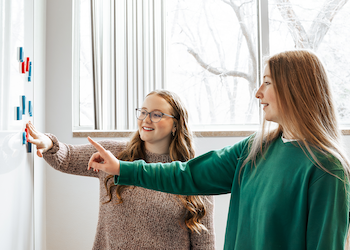

Bachelor's Degree

Master's Degree

Counseling Psychology and Special Education
"We facilitate positive growth for children, youth, and adults by preparing professionals to work with students, clients, and colleagues in complex and varied educational settings. In particular, we embrace a collaborative, evidence-based approach to serving individuals with diverse strengths and needs. We support the mission and aims of a BYU education as we integrate teaching, research, and service."
Psychology PhD Program Overview
Visit our page on BYU Graduate Studies for a detailed explanation of the Psychology PhD Program
Our graduate program has two degrees, the Clinical Psychology PhD program and the Psychology PhD program. The Clinical Psychology doctoral program is for those who want to be trained as clinicians (psychotherapists) in addition to training in research ( Click here for more information ). The Psychology doctoral program is for those who want more focused training in research, sometimes referred to as our “Non-Clinical” program.
The Psychology doctoral program offers a rigorous educational experience. The first four semesters provide broad coverage of the discipline of psychology and scientific research skills, and introduce students to the particular areas of emphasis offered in the program. During the last two years of the program, students pursue specialized coursework and training in one of three emphasis areas: Applied Social Psychology , Cognitive & Behavioral Neurosciences , & Developmental Psychology .
*Students also have the option to obtain a sub-specialty in Health Psychology within any of the above programs.
During the first semester students select a faculty advisor and a dissertation committee. By the end of the second year in the program, all students complete a second year project and poster presentation. Following the completion of these requirements, under the direction of the dissertation committee, students concentrate on coursework and research in their emphasis area. For even more reasons to come to BYU, download our graduate program brochure and visit our Frequently Asked Question page .
Program Information
While many APA programs currently prefer students to apply at the baccalaureate degree level, we welcome students with either a bachelors or masters degree.
Application Deadline: Dec 1 Entrance: Fall Semester Only Applications accepted beginning September 1st
Here is the link to the application.
If you do not have an undergraduate degree in psychology, the following prerequisite classes are required: General Psychology (Psych 111), Psychological Statistics (Psych 308), Research Design & Analysis (Psych 310), and three additional 300-level courses. Deficiencies may be addressed when admitted.
Average entrance GPA: 3.78 Approximate admissions per year: 5-8 GRE not required.
International students will need to receive a minimum score on the English proficiency tests. For more information on these tests please visit the TOEFL and the IELTS cites.
All applications are taken electronically. To apply for any graduate program at BYU fill out the online application. If you find it impossible to apply online please contact the Office of Graduate Studies in 105 FPH or by phone at 801-422-4091.
Barring unexpected circumstances such as prolonged severe illness, the Psychology PhD program should be completed within four years from the date of entry into the program. Even if a rare time allowance is made for an extreme circumstance, credits will become outdated after eight years.
Students must register for a minimum of 6 semester hours per academic year (September-August) to stay in the program. Full-time graduate student status requires registration for 4.5 credits per term or 8.5 credits per semester (9 credits for international students).
Financial Support
To see current tuition rates for both LDS and Non-LDS students, please click here. Financial support is offered through Teaching and Research Assistantships, Student Instructorships, Partial Tuition Support, Research, and Travel Support, Short-term and Long-term Loans, and Competitive Graduate Studies and other awards.
Fifteen hours of paid research or teaching assistantships are offered for two years of study, typically four semesters - $4,920 fall and winter, $2,460 spring or summer, or a total of $12,300 for the academic year.
Graduate students have the opportunity to teach undergraduate psychology courses each semester/term, after they have completed Psych 693, Teaching Psychology. A full stipend of around $2,600 is paid for a 3-credit hour course if enrollment reaches 20 or more.
Tuition assistance is available during the first four years of the program, with all students receiving scholarships for at least 1/2 the LDS tuition amount. During the past academic year, proceeds from endowments allowed us to cover the full cost of tuition for all students during Fall and Winter Semesters. We anticipate providing the same level of tuition support in future years contingent on endowment yields.
There is some funding from the department and college available for travel to conferences in which students are presenting research papers or posters.
In addition to federal government guaranteed student loans, BYU offers both short and long-term loans through internal resources. Contact the Financial Aid Office at (801)-422-4104 or online at BYU's financial aid website.
Some psychology students have also been successful in competing for a limited number of awards offered through the university, general through graduate studies or the College of Family, Home, and Social Sciences. Examples of these awards include Research Presentation Awards, Graduate Mentoring Awards, and the High Impact Doctoral Research Assistantship, and so forth.
Administrative support is also available:
1. Disabilities : Students with disabilities will be accommodated in accordance with the requirements of the Americans with Disabilities Act. University services are relatively extensive, and the program makes every effort to provide reasonable accommodations. Contact the University Accessibility Center for more information.
2. Counseling: The University provides extensive counseling services, free of charge, to all University personnel, full-time students, and their dependents, mostly through Counseling and Psychological Services. The Comprehensive Clinic also provides free services to University students.
3. Multicultural and Minority Support : Various University sponsored organization representing diverse cultures are available. Contact Multicultural Student Services for more information. The office of International Student Services provides both social and practical support to international students. A variety of support, counseling, and educational services are provided to women, coordinated through the office of BYU Women's Services and Resources.
Student Resources
For more information about program curriculum (courses, timeline, requirements, etc.) see the following links: Graduate Psychology Handbook Graduate Catalog
For more information about all things related to attending graduate school at BYU, see the following link: Graduate Studies
For more information about opportunities for grants, fellowships, and other sources of funding, see the following links: Graduate Studies funding College of Family, Home, and Social Sciences funding External Grants

Emphasis Areas
Counseling Psychology and Special Education
Graduate programs.

Counseling Psychology (PhD)

School Psychology (EdS)

Special Education (MS)
The Department of Counseling Psychology and Special Education prepares educators and professionals who work with individuals, small groups, and organizations/systems. The programs offered in the department all pursue at least two common goals. The first is to help individuals enhance the quality of their lives through meaningful personal, educational, and career development. A second common goal is to assist people in overcoming barriers to learning and to experience success and happiness in life. These barriers include unsupportive environments and individuals' difficulties in thinking, learning, making decisions, relating to others, understanding the impact of their behavior, and so forth.
Faculty implement a scientist-practitioner model through which students and faculty enhance learning through research and inquiry. Further, in dealing with those whom they serve, students apply the principles learned from research evidence. Since their work is often highly personal, it is essential that students possess and develop integrity, using professional standards of ethical conduct. They must also develop the knowledge and skills essential to promote positive change in individuals struggling with important aspects of their lives. The settings in which graduates typically serve include public and private schools, colleges, and universities.
Each program assists students in planning individual course work, receiving supervised practical experience, and obtaining appropriate credentials (certification and licensure).
Three degrees are offered through the Department of Counseling Psychology and Special Education: Special Education—MS; School Psychology—EdS; and Counseling Psychology—PhD.
The average number of students admitted varies by program as follows:
Special Education 6 every year
School Psychology 12 every year
Counseling Psychology 6 every year
Chair: Ellie L. Young Counseling Psychology Graduate Coordinator: Aaron P. Jackson School Psychology Graduate Coordinator: Ellie L. Young Special Education Graduate Coordinator: Cade Charlton
Resources & Opportunity
Computer Laboratories. The University's remote server provides access to a wide variety of computer programs including SPSS, SAS, and M+.
Graduate Student Project and Research Laboratory. Space is provided for graduate students who are working with faculty on research, evaluation, and development projects.
Study Areas. Graduate study areas are available in the CPSE Graduate Lab, the McKay School of Education Technology Education Computing Lab, and the Harold B. Lee Library.
For a more detailed description of the graduate program requirements, view the department Web page.
Financial Assistance
Graduate Assistantships. Graduate assistantships include working with selected faculty members on research projects, curriculum development, and other assignments for 5 to 20 hours per week. Several other organizations on campus, such as the Counseling and Psychological Services, often request students to serve as graduate assistants.
Scholarships. All students matriculate in one of the graduate programs will receive partial-tuition scholarships based on merit and/or need. These scholarships are awarded through the initial years of the program, prior to internships year.
University Financial Aid. Other sources of financial aid are available to students through the Financial Aid Office, A-41 ASB, Provo, UT 84602-1009. International students can contact the International Students Services Office at internationalservices.byu.edu , then select the "Scholarship" link.
BYU Graduate Studies offers several sources for support such as Graduate Mentoring Awards and Graduate Student Research Fellowship Awards.

IMAGES
COMMENTS
PhD Counseling Psychology PhD Educational Inquiry, Measurement and Evaluation PhD Instructional Psychology and Technology ... 301 MCKB - BYU Provo, UT 84602 Advisement Center: 801-422-3426 Advisement Email: [email protected] Contact the Dean's Office. LINKS. Degrees Course Catalog
PhD Counseling Psychology PhD Educational Inquiry, Measurement and Evaluation PhD Instructional Psychology and Technology ... 301 MCKB - BYU Provo, UT 84602 Advisement Center: 801-422-3426 Advisement Email: [email protected] Contact the Dean's Office. LINKS. Degrees Course Catalog
The counseling psychology training program at BYU emphasizes the educational, developmental, and multicultural functions of counseling psychologists. ... The PhD in counseling psychology is accredited by the American Psychological Association (Committee on Accreditation), 750 First Street NE, Washington, DC 20002; phone: (202) 336-5979; fax ...
Graduate; Student Resources; ... Belonging & Diversity. Alumni. Alumni; Annual Newsletters; Events; Alumni; Annual Newsletters; Events; Giving. Counseling Psychology Doctoral Program October 12, 2020 09:39 AM Register Here. Contact Us. 1001 KMBL Provo, UT 84602 (801) 422-4287 [email protected]. Connect With Us Link to facebook. Link to ...
PhD Counseling Psychology PhD Educational Inquiry, Measurement and Evaluation PhD Instructional Psychology and Technology ... 301 MCKB - BYU Provo, UT 84602 Advisement Center: 801-422-3426 Advisement Email: [email protected] Contact the Dean's Office. LINKS. Degrees Course Catalog
PhD Counseling Psychology PhD Educational Inquiry, Measurement and Evaluation PhD Instructional Psychology and Technology ... Brigham Young University Provo, UT 84602-1009. CONTACT. McKay School of Education 301 MCKB - BYU Provo, UT 84602 Advisement Center: 801-422-3426 Advisement Email: [email protected]
The Counseling Psychology program at BYU emphasizes the educational, developmental, preventative, and therapeutic functions of counseling psychologists. Students are primarily prepared to work as counseling psychologists in academic departments and counseling centers in university and college settings. Students are also
Psychology PhD Program Overview. Visit our page on BYU Graduate Studies for a detailed explanation of the Psychology PhD Program. ... Counseling: The University provides extensive counseling services, free of charge, to all University personnel, full-time students, and their dependents, mostly through Counseling and Psychological Services. The ...
The counseling psychology training program at BYU emphasizes the educational, developmental, and multicultural functions of counseling psychologists. Students are prepared to work as counseling psychologists in college counseling centers, academic departments, independent practice, and a variety of behavioral health and educational settings.
The Counseling Psychology program core faculty include full-time faculty from the Department of Counseling Psychology and Special Education and assigned faculty from the BYU Counseling and Career Center who hold a joint appointment with CPSE. Other licensed psychologists from campus and the community teach specialty classes as appropriate.